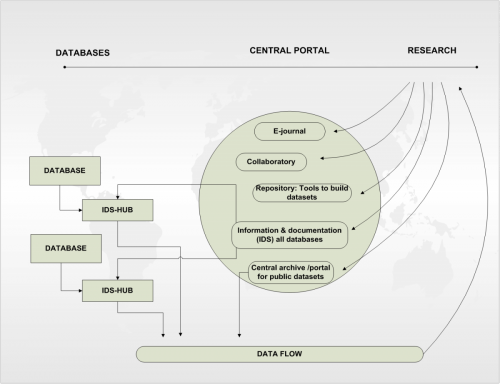Central in our network is the portal that provides access to the European databases (see the figure below ). On this website an overview will be given of all databases, their contents and the degree to which their variables have been structured into the IDS. The site will also present the standardisation rules, metadata and documentation and make them downloadable. In this way the existing expertise is made available to the research community in a systematic way. Expert knowledge will be transmitted through courses designed to clarify the IDS and through accompanying software tools for interested researchers.

The EHPS-Net functions as a collaboratory in which the portal will be the centre of all activities. The portal also offers facilities to archive and disseminate datasets from databases not equipped to handle dissemination on their own website. And, finally, the portal offers facilities to download software tools uploaded by researchers and programmers. To encourage the sharing of programmes and scripts, an e-journal will be hosted on the website in which esearchers and programmers may put their products in the form of articles. This will stimulate software sharing and it promotes a careful documentation of programmes and scripts. The databases and projects involved in the network stand to gain through improved, standardised documentation, improved visibility and accessibility, and through the possibility to compare directly with other datasets. Because of privacy regulations and/or specific regulations of databases, access to the data will be partly public and partly restricted (for example, by way of remote access).
The data extraction software will provide a type of structured data mining whereby data from the IDS are moved into file formats designed for analysis. Since the requirements of each type of analysis vary, we expect to have many specialised extraction programmes. This approach has important benefits. It is open, scalable and extendable. Any database can transfer its data to the IDS which will be documented systematically in the metadata registry.
New forms of analysis can be introduced by adding new extraction modules. Anyone can contribute an extraction module, which will be peer-reviewed. Methodologies can be examined, discussed and tested, and research results will be reproducible. This programming will be organised in pilot research projects delivering demonstrators of extraction scripts. These pilots (including datasets for the analysis of migration, fertility and social mobility) will be essential for the fine tuning of the IDS. Moreover, they will explore the potential and expand the outreach of the IDS for Europe-wide and even global comparisons of demographic processes. An online platform for teams of distributed researchers is already available at the collaboratory 'Historical Life Courses'.
